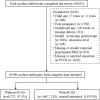Association between maternal polycystic ovary syndrome and attention-deficit/hyperactivity disorder in offspring aged 3-6 years: A Chinese population-based study
- PMID: 36699874
- PMCID: PMC9868860
- DOI: 10.3389/fpubh.2022.1032315
Association between maternal polycystic ovary syndrome and attention-deficit/hyperactivity disorder in offspring aged 3-6 years: A Chinese population-based study
Abstract
Background: Maternal polycystic ovary syndrome (PCOS) may increase the risk of attention-deficit/hyperactivity disorder (ADHD) in offspring; however, their association remains unexplored in Asian populations. Hence, this study aimed to investigate the association between maternal PCOS and ADHD in offspring aged 3-6 years and whether it differed by offspring sex.
Methods: This was a district-wide population-based study of 87,081 preschoolers from 234 kindergartens in Longhua District, Shenzhen, China. The parents were invited to complete a self-administrated questionnaire covering information on socio-demographics, maternal disease history, and child behavior. ADHD symptoms were measured with the parent-rating 26-item Swanson, Nolan, and Pelham Rating Scale (SNAP-IV). Logistic regression was performed to examine the associations between maternal PCOS and ADHD symptoms in offspring.
Results: The response rate was 80% and 63,390 mother-child pairs were included. Of the mothers, 1,667 (2.6%) reported PCOS diagnoses. The mean age of children at ADHD assessment was 4.86 ± 0.84[SD] years, and 53.6% were boys. Children with maternal PCOS had a higher risk of developing ADHD symptoms than other children (12.0 vs. 9.4%, adjusted odds ratio [OR] = 1.32, 95% CI: 1.13-1.54). The risk estimate was significant in boys (adjusted OR = 1.38, 95% CI: 1.14-1.66) but not in girls (adjusted OR = 1.23, 95% CI: 0.94-1.57, P for interaction = 0.391). Treatment of PCOS tended to be associated with a lower risk of ADHD symptoms than untreated PCOS albeit risk confidence intervals were overlapped (treated: adjusted OR = 1.28, 95% CI: 1.06-1.54 vs. untreated: adjusted OR = 1.14, 95% CI: 1.08-1.83).
Conclusion: Maternal PCOS increases the risk of developing ADHD in offspring, especially boys. Further studies are warranted to confirm our findings, and early neurodevelopmental screening may be needed in children born to mothers with PCOS.
Keywords: attention-deficit/hyperactivity disorder (ADHD); maternal polycystic ovary syndrome (PCOS); offspring; sex difference; treatment.
Copyright © 2023 Zhang, Lu, Guo, Wang, Qiu, Zhang, Zhang, Chen, Wang and Yang.
Conflict of interest statement
The authors declare that the research was conducted in the absence of any commercial or financial relationships that could be construed as a potential conflict of interest. The handling editor XL declared a past collaboration with the author WC.
Figures
Similar articles
-
Maternal polycystic ovary syndrome and attention deficit hyperactivity disorder in offspring at 3 years of age: Odense Child Cohort.Acta Obstet Gynecol Scand. 2021 Nov;100(11):2053-2065. doi: 10.1111/aogs.14259. Epub 2021 Sep 6. Acta Obstet Gynecol Scand. 2021. PMID: 34490610
-
Maternal Polycystic Ovary Syndrome and Risk for Attention-Deficit/Hyperactivity Disorder in the Offspring.Biol Psychiatry. 2017 Nov 1;82(9):651-659. doi: 10.1016/j.biopsych.2016.09.022. Epub 2016 Oct 6. Biol Psychiatry. 2017. PMID: 27889187
-
The associations of maternal polycystic ovary syndrome and hirsutism with behavioral problems in offspring.Fertil Steril. 2020 Feb;113(2):435-443. doi: 10.1016/j.fertnstert.2019.09.034. Fertil Steril. 2020. PMID: 32106995 Free PMC article.
-
Maternal polycystic ovary syndrome and the potential risk of attention-deficit/hyperactivity disorder and autism spectrum disorder in the offspring: a systematic review and meta-analysis.Eur J Contracept Reprod Health Care. 2022 Jun;27(3):253-260. doi: 10.1080/13625187.2022.2040983. Epub 2022 Feb 22. Eur J Contracept Reprod Health Care. 2022. PMID: 35191798
-
A systematic review and meta-analysis of the association between maternal polycystic ovary syndrome and neuropsychiatric disorders in children.Transl Psychiatry. 2021 Nov 8;11(1):569. doi: 10.1038/s41398-021-01699-8. Transl Psychiatry. 2021. PMID: 34750348 Free PMC article.
Cited by
-
Association of only-child status and household pet ownership with attention-deficit/hyperactivity disorder among Chinese preschool children: a population-based study.Front Public Health. 2025 Feb 11;12:1450216. doi: 10.3389/fpubh.2024.1450216. eCollection 2024. Front Public Health. 2025. PMID: 40012582 Free PMC article.
-
Maternal polycystic ovarian syndrome and offspring psychopathology and neurodevelopment.Hum Reprod. 2025 Jul 1;40(7):1257-1265. doi: 10.1093/humrep/deaf079. Hum Reprod. 2025. PMID: 40380372 Review.
-
Plant medicine metabolite Yulinzhu treating neurological disorder causing polycystic ovary syndrome: a systematic review and a meta-analysis.Front Pharmacol. 2024 Aug 15;15:1458621. doi: 10.3389/fphar.2024.1458621. eCollection 2024. Front Pharmacol. 2024. PMID: 39211785 Free PMC article.
References
Publication types
MeSH terms
LinkOut - more resources
Full Text Sources
Medical


